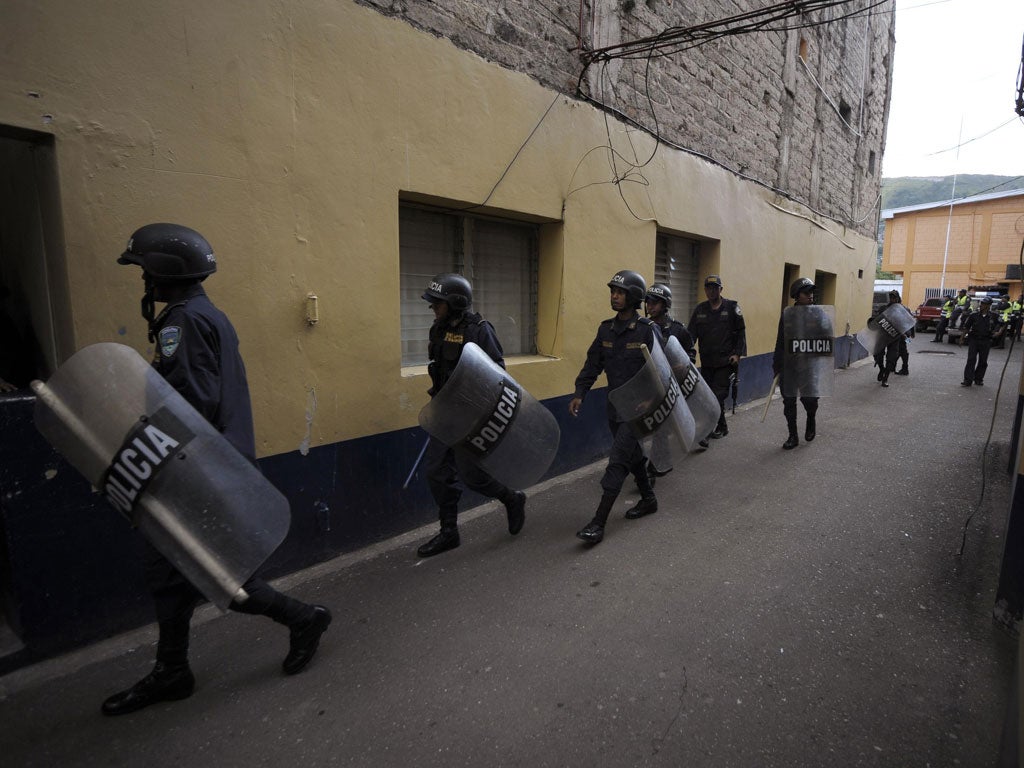Can private cities save a nation with world's worst murder rate?
Fears of new 'banana republic' as US firm signs Honduras deal

Your support helps us to tell the story
From reproductive rights to climate change to Big Tech, The Independent is on the ground when the story is developing. Whether it's investigating the financials of Elon Musk's pro-Trump PAC or producing our latest documentary, 'The A Word', which shines a light on the American women fighting for reproductive rights, we know how important it is to parse out the facts from the messaging.
At such a critical moment in US history, we need reporters on the ground. Your donation allows us to keep sending journalists to speak to both sides of the story.
The Independent is trusted by Americans across the entire political spectrum. And unlike many other quality news outlets, we choose not to lock Americans out of our reporting and analysis with paywalls. We believe quality journalism should be available to everyone, paid for by those who can afford it.
Your support makes all the difference.Honduras has unveiled a radical free-market plan to establish three "charter cities" in the violence-racked Central American nation.
The government this week signed an agreement with US developers MKG group to begin building the cities – complete with their own governments, laws, courts, police forces and tax systems – from scratch early next year.
The plan's backers say it is the only way to kick start development in Honduras, which has the world's worst murder rate – 68 times higher than the UK's – and where 65 per cent of the 8 million-strong population lives below the poverty line.
However, critics warn that it could mark a return to the dark days in Honduras when US companies controlled the government, owned vast tracts of territory and ordered police to massacre striking workers – an era which prompted political scientists to coin the term "banana republic".
MKG will initially invest $14m for construction of the first phase of the first city, near Puerto Castilla on the Caribbean coast, which it says will immediately create 5,000 jobs. In total, the company predicts the three cities will lead to 200,000 new jobs.
"The future will remember this day as the day that Honduras began developing," said MKG Group CEO Mark Strong at the signing ceremony.
Carlos Piñeda, who chairs the Commission to Promote Public-Private Partnerships, added that the deal was a "development instrument typical of first world countries", and marked the largest foreign direct investment in Honduras in 50 years. The signing follows a constitutional reform last year to permit "Special Administrative Regions" that will attempt to emulate the economic success of Asian city states such as Hong Kong and Singapore.
In recent years, Honduras has attempted to diversify its economy away from bananas and coffee, to include exports of clothing and car parts. But a massive wave of violent crime, triggered by drug cartels and savage street gangs known as "maras", has stunted economic growth, and even prompted analysts to talk of the country as a failing state.
Opponents claim outsourcing the government's responsibilities to the private sector will only further undermine the rule of law and weaken Honduras' democracy, which remains fragile following a 2009 coup. Edmundo Orellana, a former attorney general and member of congress, has warned that the charter cities would allow "multinational corporations" to establish "protectorates" by stealing sovereignty from citizens.
"We are going to see long, eternal queues like we see in Palestine [for people] to go to work in Israel, or queues just to move around," he told Honduran newspaper La Prensa.
That allegation is likely to strike a nerve in Honduras which, along with neighbouring Guatemala, was dominated by the Standard Fruit Company and United Fruit Company for much of the 20th Century. The two corporate rivals built much of Honduras' modest infrastructure, including railways to transport banana harvests to Caribbean ports. Yet they have been lambasted for interfering in national politics – including pushing the Eisenhower administration to orchestrate the infamous 1954 coup against Guatemala's social democratic government, which led to decades of brutal civil war.
MKG has yet to line up its first tenants but expects most will be medium-sized service and manufacturing companies, including textile firms, call centres, data-processing companies and product assembly lines. There are already numerous free trade zones in Mexico and Central America, where assembly lines known as "maquiladoras" piece together cars, computers and other exports, mainly for the US market.
The charter cities' internal laws would have to comply with international human rights and other legislation. But according to the government, they would have full autonomy in all areas other than foreign and defence policy, national elections and issuing identity documents.
Bright lights: Small city states
Monaco
Monte Carlo casino and Monaco Grand Prix are major tourist draws, but it is the glamorous principality's advantageous tax regime that cements its reputation as a playground for the wealthy. It operates under a constitutional monarchy.
Republic of Singapore
Since gaining independence from Malaysia in 1965, Singapore has become one of the world's most prosperous places. Its population is subject to strict social laws but enjoys a high standard of living.
Vatican City
The seat of the Roman Catholic Church's leadership is the world's smallest independent state. With a population of about 800, mostly priests and nuns, it has its own system of governance.
Join our commenting forum
Join thought-provoking conversations, follow other Independent readers and see their replies
Comments